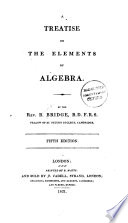 | Bewick Bridge - Algebra - 1821 - 648 pages
...whether an equation Contains impossible roots. The method of detecting roots of this kind by means of the equation whose roots are the squares of the differences of the roots of the given equation, has been omitted on account of the difficulty attending the II • .if the transformation.... | |
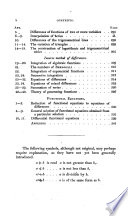 | Charles Brooke - Mathematics - 1829 - 386 pages
...Bour. 303, 8.) THE EauATioN OF DIFFERENCES. (39.) Let/ + ft,-!/-1 + br_tf-°~ + ... + Ъ1у + Ь = Obe the equation whose roots are the squares of the differences of the roots of ф(а>) = 0, and cr,, <r2, &c. the sums of the 1st, 2nd, &c. powers of its roots. ^__ С* С* С* О... | |
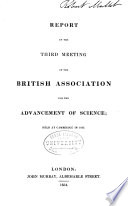 | British Association for the Advancement of Science - Science - 1834 - 564 pages
...the value of A. Waring first, and subsequently Lagrange, proposed for this purpose the formation of the equation whose roots are the squares of the differences of the roots of the given equation. If we subsequently transform this equation into one whose roots are the reciprocals... | |
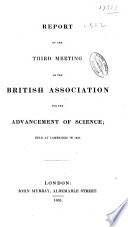 | British Association for the Advancement of Science - Science - 1834 - 562 pages
...the value of A. Waring first, and subsequently Lagrange, proposed for this purpose the formation of the equation whose roots are the squares of the differences of the roots of the given equation. If we subsequently transform this equation into one whose roots are the reciprocals... | |
 | Charles William Hackley - Algebra - 1834 - 38 pages
...approximation ? 350. 218. When the roots differ by less than unity, how are they found ? Ans. Find the equation whose roots are the squares of the differences of the roots of the given equation ; then find the least limit to the roots of this equation ; suppose ^ to be this... | |
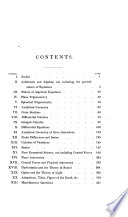 | Mathematics - 1836 - 366 pages
...real roots. 84. Take away the third term from the equation a;4 — l8x3 — 6Qx2 + x — 2 = 0. Find the equation whose roots are the squares of the differences of the roots of the equation x3 + qx + r = 0. 85. The equation x3 — qa? + r = 0 has two impossible TO^ roots if —... | |
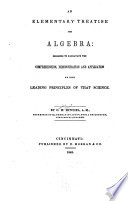 | Ormsby MacKnight Mitchel - Algebra - 1845 - 308 pages
...resume the equation, If we make y2=z, and substitute, we obtain ^ z? — 42r!+441z— 49=0. This is an equation whose roots are the squares of the differences of the roots of the primitive equation, since *=y2. Let us now find the least limit to the roots of this equation.... | |
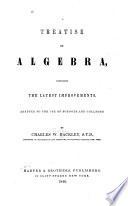 | Charles William Hackley - Algebra - 1846 - 544 pages
...form y*"+PlT-*+<lir-4+, &c., +P=O .... (3) and if we make y*=z, we have '-{-, &c. +«=0 ...... (4) as the equation whose roots are the squares of the differences of the roots of the proposed equation. 279. As an application of the foregoing principles, let us find the equation... | |
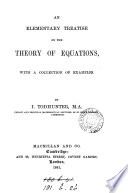 | Isaac Todhunter - Equations, Theory of - 1861 - 330 pages
...0, and may therefore be calculated. 255. In Art. 1 09 we have explained one use which we may make of the equation whose roots are the squares of the differences of the situation of the real roots of the proposed equation. But Sturm's theorem now answers this purpose... | |
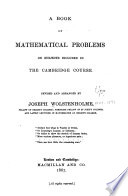 | Joseph Wolstenholme - Mathematics - 1867 - 368 pages
...= 0. 911. Find the sum of the wth powers of the roots of the equation x' — 3? + 1 = 0 ; and form the equation whose roots are the squares of the differences of the roots of the given equation. 912. If sr denote the sum of the rth powers of the roots of the equation x" +plx"~'... | |
| |